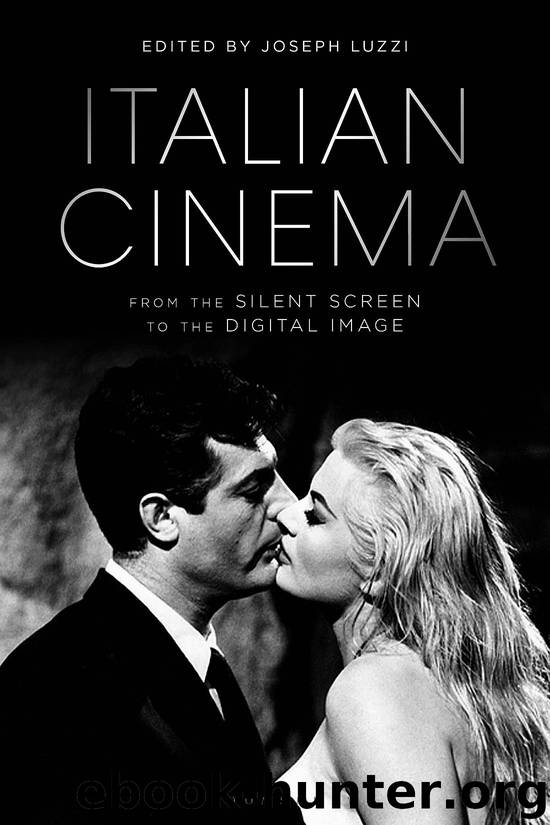Italian Cinema From the Silent Screen to the Digital Image by Joseph Luzzi;

Author:Joseph Luzzi;
Language: eng
Format: epub
Publisher: Bloomsbury USA
5 Academic Theory and the Encounter with History
It is difficult to establish exactly when the second great era of Italian film theory came to an end. After the exciting conferences in Pesaro, the 1970s were certainly a two-faced decade. On the one hand, the decade coincided with great efforts to deepen and systematize the ideas of the 1960s. On the other hand, it was easy to perceive in the 1970s a growing annoyance for theoretical reflection on film, which was increasingly considered a dry alternative to socially engaged criticism and the practice of filmmaking itself. A leading role in undermining the certainties of the past decade and its tendency to interpret cinema as verbal language can be attributed to Garroni, who explicitly targeted Metz, Pasolini, Eco, Barthes, and Deleuze in important essays from Semiotica ed estetica (Semiotics and Aesthetics, 1968) and Ricognizione della semiotica (Semiotics Reconsidered, 1977).
In part, the departure of critics and directors from theory also turned on a change in the professional status of the theoreticians. Before the 1970s, not a single teenager in love with movies could have answered the question “What do you want to do when you grow up?” by saying “film theorist.” But with the spread of film studies programs at universities, a hypothetical exchange of this kind suddenly became possible (albeit unlikely). Thus, while until then Italian theorists had been journalists, writers, directors, screenwriters, and only occasionally professors, from the 1970s onward there appeared a new and well-defined professional figure that could often find a home inside an academic discipline. If, as Cecchi said in the 1930s, “cinema is the Foreign Legion of intelligence,” the 1970s coincided with the enlistment of many of former legionaries into a regular army. The first university courses had already begun at the end of the 1950s. An adjunct professor since 1961, Chiarini in 1968 became the first Italian professor of film history and film criticism along with Aristarco. Eventually the most authoritative critics and journalists also migrated to the university without abandoning their socially engaged writing (e.g., Edoardo Bruno and Miccichè). And the foundation of the first Department of Art, Music, and Spectacle (DAMS) in Bologna in 1970, located within the Faculty of Literature and Philosophy, also played an important role in this process.With the academic institutionalization of film studies, newspaper critics gradually began to leave theoretical questions to the professors. No example seems more appropriate than the one offered by Enzo Ungari (1948–85). Essayist, cultural organizer, and screenwriter (credits include Bernardo Bertolucci’s The Last Emperor), Ungari was the best film critic of his generation and had a clear penchant for theory. Nevertheless, it is enough to browse his two collections of essays, Schermo delle mie brame (Screen of My Desires, 1978) and Proiezioni private (Private Projections, 1996), to see how in the end he always avoids generalizing concepts. In his pages, there is no shortage of general ideas, as in his brilliant essays about the directors of photography’s artistic status (“I piaceri dell’occhio: Grandi cacciatori di
Download
This site does not store any files on its server. We only index and link to content provided by other sites. Please contact the content providers to delete copyright contents if any and email us, we'll remove relevant links or contents immediately.
The Kite Runner by Khaled Hosseini(4963)
Gerald's Game by Stephen King(4386)
Dialogue by Robert McKee(4178)
The Perils of Being Moderately Famous by Soha Ali Khan(4071)
Story: Substance, Structure, Style and the Principles of Screenwriting by Robert McKee(3334)
The 101 Dalmatians by Dodie Smith(3317)
The Pixar Touch by David A. Price(3226)
Confessions of a Video Vixen by Karrine Steffans(3111)
How Music Works by David Byrne(2970)
Fantastic Beasts: The Crimes of Grindelwald by J. K. Rowling(2856)
Harry Potter 4 - Harry Potter and The Goblet of Fire by J.K.Rowling(2819)
Slugfest by Reed Tucker(2811)
The Mental Game of Writing: How to Overcome Obstacles, Stay Creative and Productive, and Free Your Mind for Success by James Scott Bell(2773)
4 - Harry Potter and the Goblet of Fire by J.K. Rowling(2543)
Screenplay: The Foundations of Screenwriting by Syd Field(2444)
Scandals of Classic Hollywood: Sex, Deviance, and Drama from the Golden Age of American Cinema by Anne Helen Petersen(2405)
Wildflower by Drew Barrymore(2385)
The Complete H. P. Lovecraft Reader by H.P. Lovecraft(2375)
Casting Might-Have-Beens: A Film by Film Directory of Actors Considered for Roles Given to Others by Mell Eila(2311)
